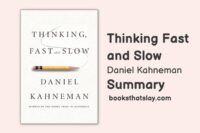The Ruthless Elimination of Hurry Summary and Key Lessons
“The Ruthless Elimination of Hurry” by John Mark Comer is an exploration of the modern dilemma of busyness and its impact on spiritual and emotional well-being.
Comer draws from his own experiences with the fast-paced nature of life, particularly in the context of urban environments. The book focuses on the profound yet simple wisdom derived from Dallas Willard, a renowned philosopher and spiritual mentor, who once advised, “You must ruthlessly eliminate hurry from your life.”
Full Summary
The book begins by diagnosing the problem of hurry in contemporary life. Comer vividly describes how the fast-paced nature of today’s world, fueled by advancements in technology and an ever-increasing societal expectation for productivity, leads to a pervasive sense of rush and anxiety.
He argues that this chronic hurry undermines our ability to live a fulfilling and spiritually enriched life. Drawing from his own experiences and struggles with the fast-paced nature of modern ministry, Comer sets the stage for a journey towards a slower, more intentional way of living.
In the second part of the book, Comer delves into the theological and philosophical underpinnings of his argument.
He draws heavily on the teachings of Jesus, emphasizing the slower pace at which Jesus lived his life and interacted with others. Comer suggests that the modern church has often strayed from this model, becoming caught up in the same hurry and busyness that characterizes the rest of society.
He references biblical passages and stories to illustrate how a life of hurry is at odds with the kind of life Jesus exemplified and taught. This section is not just a critique but also serves as a call to rediscover the spiritual practices that can lead us out of the cycle of rush and into a more meaningful existence.
Strategies and Practicality
The book then shifts to a more practical approach, as Comer offers concrete strategies for escaping the trap of hurry.
He introduces the concept of ‘ruthless elimination of hurry’, a phrase borrowed from philosopher Dallas Willard, to describe the deliberate and sometimes radical steps needed to slow down one’s life. He advocates for practices such as Sabbath-keeping, simplicity, and slowing down as means to resist the culture of speed.
Comer doesn’t just present these practices as beneficial, but as essential for those who want to live a life that is deeply connected to God, others, and their own soul. The emphasis is on making intentional choices that align with a slower, more contemplative lifestyle.
Impact of Technology
In one section, Comer critically examines the role of smartphones, social media, and the constant connectivity of the digital age in perpetuating a culture of hurry.
Comer is not anti-technology but advocates for a more mindful and controlled use of it. He suggests practical steps for setting boundaries around technology use, arguing that these boundaries are crucial for creating space for rest, relationships, and spiritual growth.
This part of the book resonates with many of us who feel overwhelmed by the demands of a digitally connected world.
Concluding Chapters
Finally, “The Ruthless Elimination of Hurry” concludes with a reflective and hopeful outlook. Comer reiterates the importance of adopting a slower pace of life for the sake of our spiritual health, relationships, and overall quality of life.
He encourages us to start small, recognizing that cultural change begins at an individual level. The book ends with an invitation to embark on a lifelong journey of resisting hurry, emphasizing that this is not a one-time fix but a continual process of choosing a different way of life.

Also Read: First They Killed My Father Summary and Key Lessons
Key Lessons
1. The Importance of Slowing Down for Spiritual and Emotional Well-being
Comer emphasizes that the constant rush and busyness of modern life can lead to a shallow existence, where one’s spiritual life and personal relationships are neglected.
He points out that many of the practices Jesus engaged in, such as solitude, prayer, and deep conversations, require time and cannot be rushed. By intentionally slowing down, we create the space needed for meaningful interactions, self-reflection, and a deeper connection with our faith.
Comer suggests practical steps such as setting aside specific times for rest and unplugging from digital devices to help cultivate a slower, more intentional pace of life.
2. The Necessity of Establishing Boundaries with Technology
In an age where digital devices dominate much of our lives, Comer argues that constant connectivity can lead to a sense of perpetual hurry, diminishing our ability to be present and fully engaged with those around us and our own spiritual journey.
He stresses the importance of being intentional about how and when we use technology, suggesting practices such as designated tech-free times, mindful consumption of digital media, and the use of technology in ways that enhance rather than detract from our quality of life.
By setting these boundaries, we can resist the urge to constantly check our devices, thereby reducing anxiety and creating room for more meaningful activities and interactions.
Also Read: To Sell is Human Summary and Key Lessons
3. The Power of Simplicity and Sabbath-keeping
Comer discusses how living a simpler life, free from the relentless pursuit of material possessions and societal status, can lead to greater contentment and peace.
He suggests that by focusing on what truly matters, such as relationships and spiritual growth, we can find joy and fulfillment that material success alone cannot provide. Additionally, the practice of Sabbath-keeping, or setting aside a regular time for rest and worship, is highlighted as a crucial antidote to the culture of hurry.
This practice is not just about physical rest, but also about creating a sacred time for spiritual rejuvenation and connection with God.
Comer argues that these practices are not only beneficial but essential for maintaining a healthy balance in life and keeping our focus on what is truly important.
Final Thoughts
“The Ruthless Elimination of Hurry” is a thoughtful exploration of how the pace of modern life impacts our well-being.
Comer’s integration of biblical perspectives with practical advice makes it a compelling read for those seeking a more meaningful and balanced life. His emphasis on simplicity, intentionality, and community offers a refreshing antidote to the culture of constant busyness.
The book serves as a gentle reminder of the benefits of slowing down and the richness that can be found in a more deliberate approach to living.
Read our other summaries


